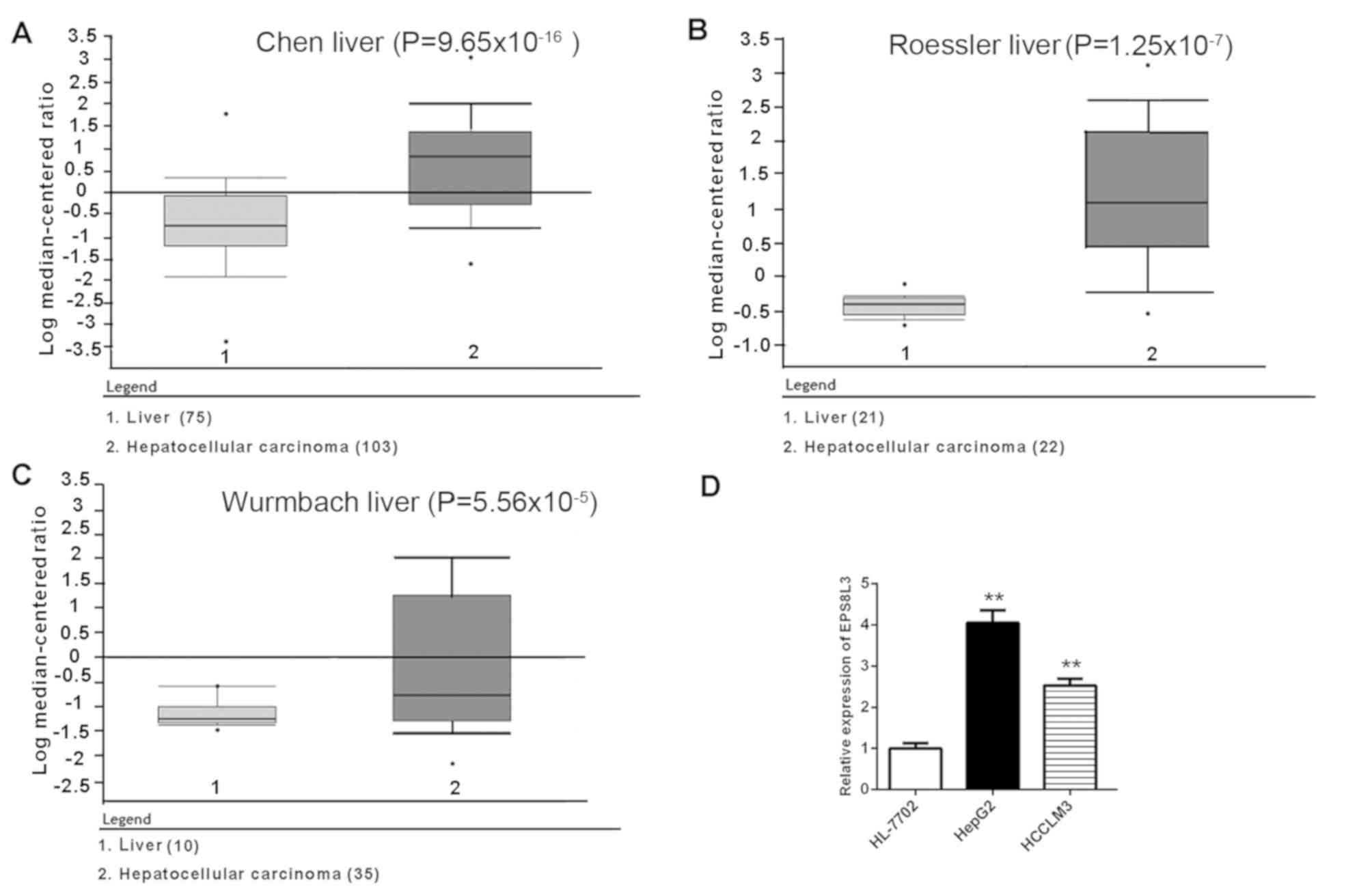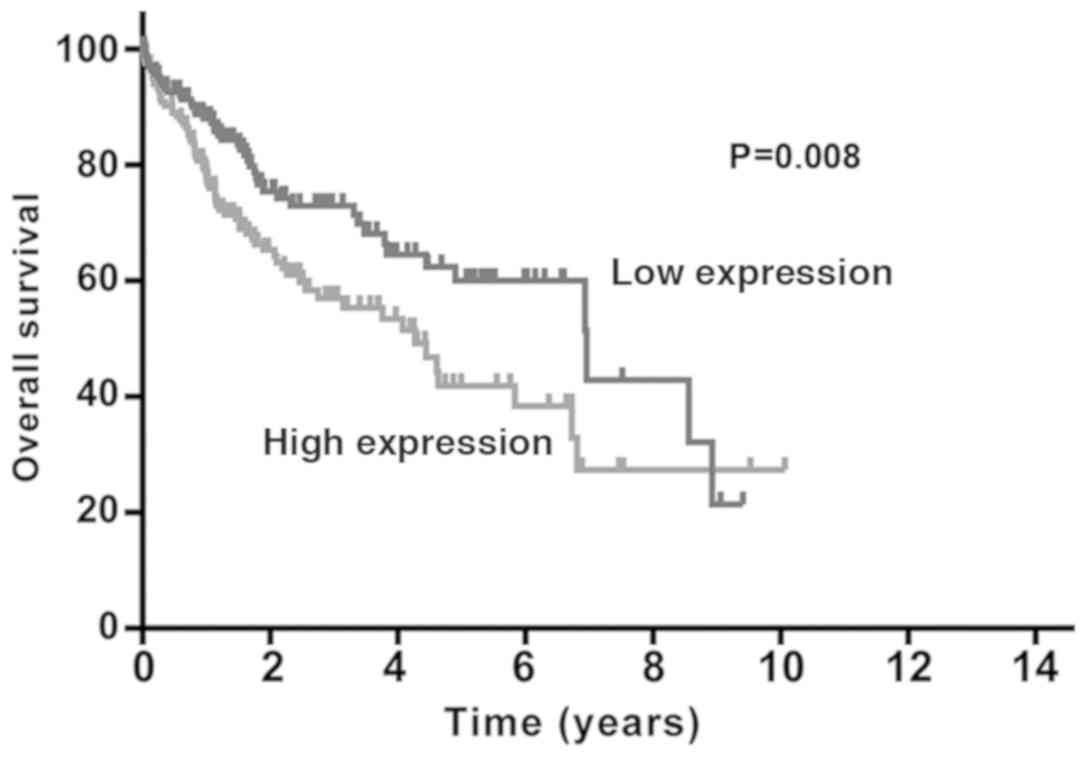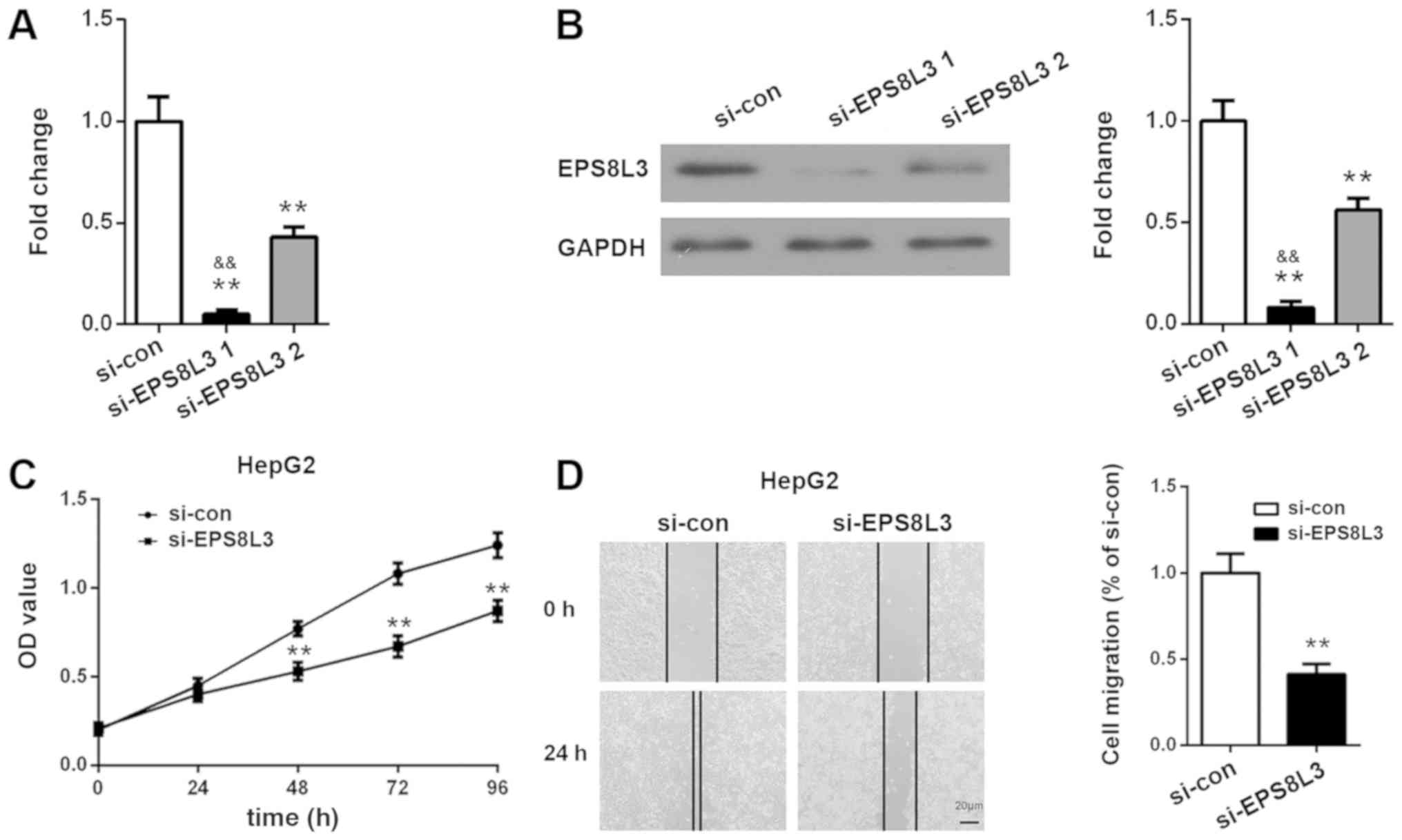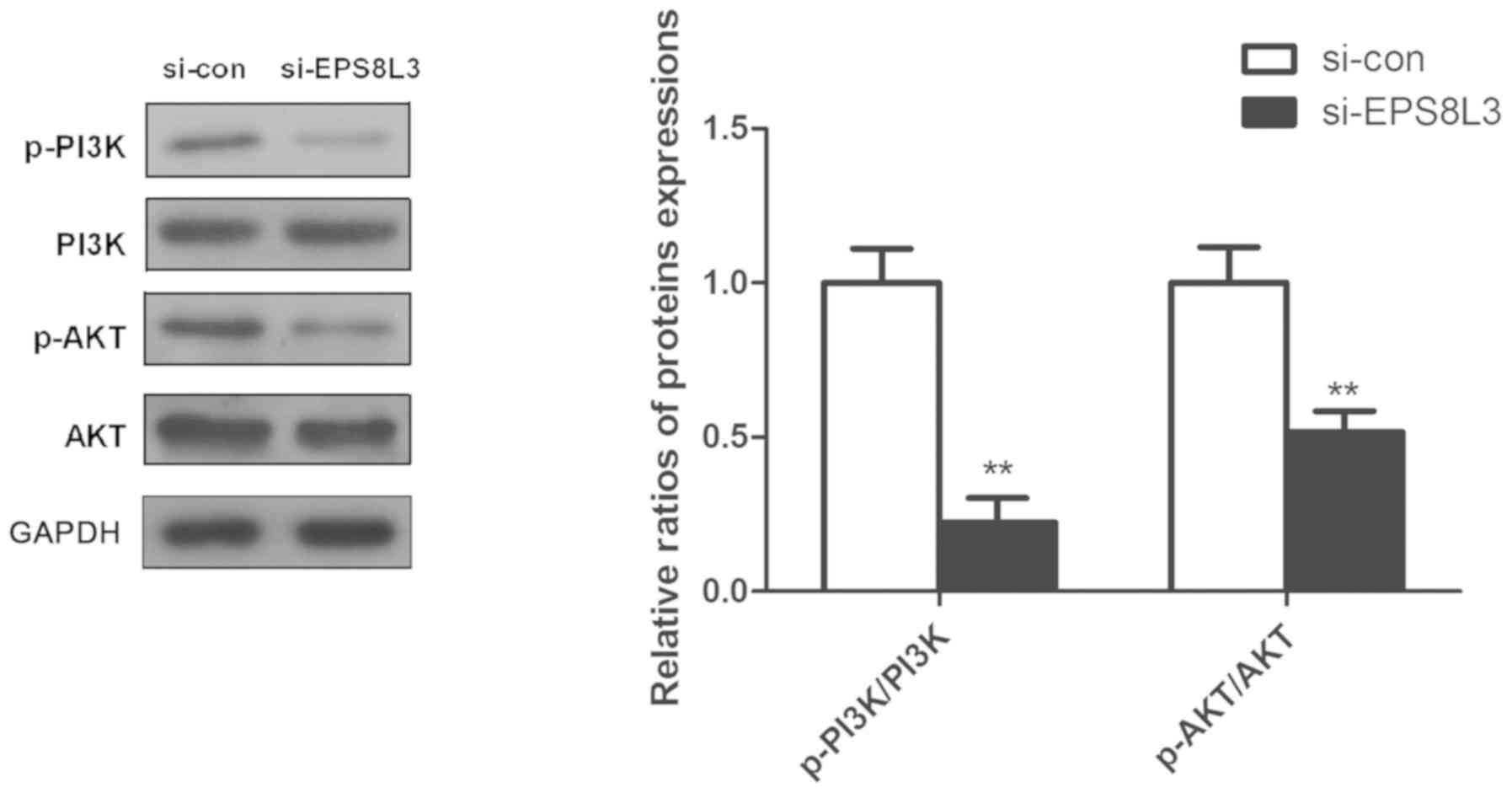|
1
|
Bray F, Ferlay J, Soerjomataram I, Siegel
RL, Torre LA and Jemal A: Global cancer statistics 2018: GLOBOCAN
estimates of incidence and mortality worldwide for 36 cancers in
185 countries. CA Cancer J Clin. 68:394–424. 2018. View Article : Google Scholar : PubMed/NCBI
|
|
2
|
Wu M, Liu Z, Zhang A and Li N:
Identification of key genes and pathways in hepatocellular
carcinoma: A preliminary bioinformatics analysis. Medicine
(Baltimore). 98:e142872019. View Article : Google Scholar : PubMed/NCBI
|
|
3
|
Haines K, Sarabia SF, Alvarez KR,
Tomlinson G, Vasudevan SA, Heczey AA, Roy A, Finegold MJ, Parsons
DW, Plon SE and López-Terrada D: Characterization of pediatric
hepatocellular carcinoma reveals genomic heterogeneity and diverse
signaling pathway activation. Pediatr Blood Cancer. 66:e277452019.
View Article : Google Scholar : PubMed/NCBI
|
|
4
|
Wu M, Liu Z, Li X, Zhang A, Lin D and Li
N: Analysis of potential key genes in very early hepatocellular
carcinoma. World J Surg Oncol. 17:772019. View Article : Google Scholar : PubMed/NCBI
|
|
5
|
Fu J and Wang H: Precision diagnosis and
treatment of liver cancer in China. Cancer Lett. 412:283–288. 2018.
View Article : Google Scholar : PubMed/NCBI
|
|
6
|
Della Corte C, Triolo M, Iavarone M and
Sangiovanni A: Early diagnosis of liver cancer: An appraisal of
international recommendations and future perspectives. Liver Int.
36:166–176. 2016. View Article : Google Scholar : PubMed/NCBI
|
|
7
|
Maluccio M and Covey A: Recent progress in
understanding, diagnosing, and treating hepatocellular carcinoma.
CA Cancer J Clin. 62:394–399. 2012. View Article : Google Scholar : PubMed/NCBI
|
|
8
|
El-Serag HB and Rudolph KL: Hepatocellular
carcinoma: Epidemiology and molecular carcinogenesis.
Gastroenterology. 132:2557–2576. 2007. View Article : Google Scholar : PubMed/NCBI
|
|
9
|
Yeudall A and Patel V: EPS8 signaling as a
therapeutic target in oral cancer. Oral Dis. 24:128–131. 2018.
View Article : Google Scholar : PubMed/NCBI
|
|
10
|
Ohshima K, Hatakeyama K, Kanto K, Ide T,
Watanabe Y, Moromizato S, Wakabayashi-Nakao K, Sakura N, Yamaguchi
K and Mochizuki T: Comparative proteomic analysis identifies
exosomal Eps8 protein as a potential metastatic biomarker for
pancreatic cancer. Oncol Rep. 41:1019–1034. 2019.PubMed/NCBI
|
|
11
|
Wen Q, Jiao X, Kuang F, Hou B, Zhu Y, Guo
W, Sun G, Ba Y, Yu D, Wang D, et al: FoxO3a inhibiting expression
of EPS8 to prevent progression of NSCLC: A new negative loop of
EGFR signaling. EBioMedicine. 40:198–209. 2019. View Article : Google Scholar : PubMed/NCBI
|
|
12
|
Nasri E, Wiesen LB, Knapik JA and
Fredenburg KM: Eps8 expression is significantly lower in
p16+ head and neck squamous cell carcinomas (HNSCCs)
compared with p16− HNSCCs. Hum Pathol. 72:45–51. 2018.
View Article : Google Scholar : PubMed/NCBI
|
|
13
|
Wang Q and Yong L: Eps8, a therapeutic
potential target for cancer. Hum Pathol. 82:300–301. 2018.
View Article : Google Scholar : PubMed/NCBI
|
|
14
|
Chen Y, Xie X, Wu A, Wang L, Hu Y, Zhang H
and Li Y: A synthetic cell-penetrating peptide derived from nuclear
localization signal of EPS8 exerts anticancer activity against
acute myeloid leukemia. J Exp Clin Cancer Res. 37:122018.
View Article : Google Scholar : PubMed/NCBI
|
|
15
|
Offenhäuser N, Castelletti D, Mapelli L,
Soppo BE, Regondi MC, Rossi P, D'Angelo E, Frassoni C, Amadeo A,
Tocchetti A, et al: Increased ethanol resistance and consumption in
Eps8 knockout mice correlates with altered actin dynamics. Cell.
127:213–226. 2006. View Article : Google Scholar : PubMed/NCBI
|
|
16
|
Tocchetti A, Confalonieri S, Scita G, Di
Fiore PP and Betsholtz C: In silico analysis of the EPS8 gene
family: Genomic organization, expression profile, and protein
structure. Genomics. 81:234–244. 2003. View Article : Google Scholar : PubMed/NCBI
|
|
17
|
Zeng CX, Tang LY, Xie CY, Li FX, Zhao JY,
Jiang N, Tong Z, Fu SB, Wen FJ and Feng WS: Overexpression of
EPS8L3 promotes cell proliferation by inhibiting the transactivity
of FOXO1 in HCC. Neoplasma. 65:701–707. 2018. View Article : Google Scholar : PubMed/NCBI
|
|
18
|
Livak KJ and Schmittgen TD: Analysis of
relative gene expression data using real-time quantitative PCR and
the 2(-Delta Delta C(T)) method. Methods. 25:402–408. 2001.
View Article : Google Scholar : PubMed/NCBI
|
|
19
|
Chen H, Li H and Chen Q: INPP4B reverses
docetaxel resistance and epithelial-to-mesenchymal transition via
the PI3K/Akt signaling pathway in prostate cancer. Biochem Biophys
Res Commun. 477:467–472. 2016. View Article : Google Scholar : PubMed/NCBI
|
|
20
|
Sheng J, Shen L, Sun L, Zhang X, Cui R and
Wang L: Inhibition of PI3K/mTOR increased the sensitivity of
hepatocellular carcinoma cells to cisplatin via interference with
mitochondrial-lysosomal crosstalk. Cell Prolif. 52:e126092019.
View Article : Google Scholar : PubMed/NCBI
|
|
21
|
He YZ, Liang Z, Wu MR, Wen Q, Deng L, Song
CY, Wu BY, Tu SF, Huang R and Li YH: Overexpression of EPS8 is
associated with poor prognosis in patients with acute lymphoblastic
leukemia. Leuk Res. 39:575–581. 2015. View Article : Google Scholar : PubMed/NCBI
|
|
22
|
Li M, Yang J, Zhang L, Tu S, Zhou X, Tan
Z, Zhou W, He Y and Li Y: A low-molecular-weight compound exerts
anticancer activity against breast and lung cancers by disrupting
EGFR/Eps8 complex formation. J Exp Clin Cancer Res. 38:2112019.
View Article : Google Scholar : PubMed/NCBI
|
|
23
|
Chen C, Liang Z, Huang W, Li X, Zhou F, Hu
X, Han M, Ding X and Xiang S: Eps8 regulates cellular proliferation
and migration of breast cancer. Int J Oncol. 46:205–214. 2015.
View Article : Google Scholar : PubMed/NCBI
|
|
24
|
Ding X, Zhou F, Wang F, Yang Z, Zhou C,
Zhou J, Zhang B, Yang J, Wang G, Wei Z, et al: Eps8 promotes
cellular growth of human malignant gliomas. Oncol Rep. 29:697–703.
2013. View Article : Google Scholar : PubMed/NCBI
|
|
25
|
Schoenherr C, Serrels B, Proby C,
Cunningham DL, Findlay JE, Baillie GS, Heath JK and Frame MC: Eps8
controls Src- and FAK-dependent phenotypes in squamous carcinoma
cells. J Cell Sci. 127:5303–5316. 2014. View Article : Google Scholar : PubMed/NCBI
|
|
26
|
Chen H, Wu X, Pan ZK and Huang S:
Integrity of SOS1/EPS8/ABI1 tri-complex determines ovarian cancer
metastasis. Cancer Res. 70:9979–9990. 2010. View Article : Google Scholar : PubMed/NCBI
|
|
27
|
Li YH, Xue TY, He YZ and Du JW: Novel
oncoprotein EPS8: A new target for anticancer therapy. Future
Oncol. 9:1587–1594. 2013. View Article : Google Scholar : PubMed/NCBI
|
|
28
|
Chen YJ, Shen MR, Chen YJ, Maa MC and Leu
TH: Eps8 decreases chemosensitivity and affects survival of
cervical cancer patients. Mol Cancer Ther. 7:1376–1385. 2008.
View Article : Google Scholar : PubMed/NCBI
|
|
29
|
Yu HY, Kim SO, Jin CY, Kim GY, Kim WJ, Yoo
YH and Choi YH: β-lapachone-induced apoptosis of human gastric
carcinoma AGS cells is caspase-dependent and regulated by the
PI3K/Akt pathway. Biomol Ther (Seoul). 22:184–192. 2014. View Article : Google Scholar : PubMed/NCBI
|
|
30
|
Fu YL, Zhang QH, Wang XW and He H:
Antidiabetic drug metformin mitigates ovarian cancer SKOV3 cell
growth by triggering G2/M cell cycle arrest and inhibition of
m-TOR/PI3K/Akt signaling pathway. Eur Rev Med Pharmacol Sci.
21:1169–1175. 2017.PubMed/NCBI
|
|
31
|
Paplomata E and O'Regan R: The
PI3K/AKT/mTOR pathway in breast cancer: Targets, trials and
biomarkers. Ther Adv Med Oncol. 6:154–166. 2014. View Article : Google Scholar : PubMed/NCBI
|
|
32
|
Zhang H, Cao Y, Chen Y, Li G and Yu H:
Apatinib promotes apoptosis of the SMMC-7721 hepatocellular
carcinoma cell line via the PI3K/Akt pathway. Oncol Lett.
15:5739–5743. 2018.PubMed/NCBI
|
|
33
|
Fu X, Liu M, Qu S, Ma J, Zhang Y, Shi T,
Wen H, Yang Y, Wang S, Wang J, et al: Exosomal microRNA-32-5p
induces multidrug resistance in hepatocellular carcinoma via the
PI3K/Akt pathway. J Exp Clin Cancer Res. 37:522018. View Article : Google Scholar : PubMed/NCBI
|
|
34
|
Xu M, Shorts-Cary L, Knox AJ,
Kleinsmidt-Demasters B, Lillehei K and Wierman ME: Epidermal growth
factor receptor pathway substrate 8 is overexpressed in human
pituitary tumors: Role in proliferation and survival.
Endocrinology. 150:2064–2071. 2009. View Article : Google Scholar : PubMed/NCBI
|
|
35
|
Wang H, Patel V, Miyazaki H, Gutkind JS
and Yeudall WA: Role for EPS8 in squamous carcinogenesis.
Carcinogenesis. 30:165–174. 2009. View Article : Google Scholar : PubMed/NCBI
|


















